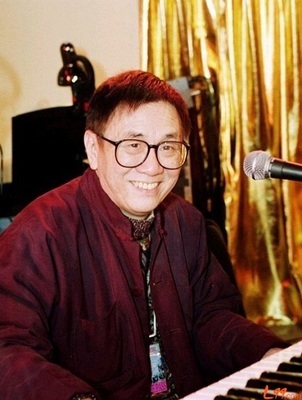粤语流行曲的发展与兴衰:香港流行音乐研究
时间:2014-7-18 12:26
浏览:8495
黄霑在逝世前一年提交了这篇论文,评审结果以最高“杰出”一级获取博士学位,其导师与考委会对他的评价都非常高。黃霑其实是一位很严肃认真的学者。以黄霑先生的学识和经历,精心打造的这篇论文的,是不可多得的宝藏。
本文是论文简介和目录,全文请点击:【THE RISE AND DECLINE OF CANTO POP: A STUDY OF HONG KONG POPULAR MUSIC (1949-1997) 粤语流行曲的发展与兴衰:香港流行音乐研究(1949-1997)】

Abstract of thesis
THE RISE AND DECLINE OF CANTO POP: A STUDY OF HONG KONG POPULAR MUSIC (1949-1997)
粤语流行曲的发展与兴衰:香港流行音乐研究(1949-1997)
submitted by
WONG JUM SUM
for the degree of Doctor of Philosophy
at the University of Hong Kong
in May 2003
Abstract
This study examines the development of Hong Kong's popular music. Cantonese opera and operatic excerpts were quite popular among the Hong Kong people before 1949. But a change came shortly afterwards - "shidaiqu" (mandarin contemporary songs) soon rose to dominance, ironically in a society where the population was mainly Cantonese people who were unfamiliar with mandarin.
Shidaiqu began in Shanghai in the twenties. Western influences, such as jazz, helped shape their style. These songs, considered to be bourgeois, decadent and pornographic were banned by the government after 1949, and composers, lyricists, as well as musicians emigrated to Hong Kong. Soon, Hong Kong, with a growing audience, became the center for shidaiqu and started to export its production to South-East Asia.
Hong Kong's youths, meanwhile, also followed Anglo-American pop and enjoyed the songs of Patti Page, Doris Day and Elvis Presley. In 1964, the Beatles came to perform and created a craze for local band formation, which later produced pop idol Sam Hui, who began singing English Rock "n" Roll songs. Taiwanese singers too, started to take Hong Kong by storm in the late sixties with their sugary voices.
However, these imports lacked something vital: they did not express the true feelings of the Hong Kong people. By the end of the 1960s, though, a true Hong Kong entertainment style blossomed.
As TV sets spread to every home, drama series were the rage and their theme songs, now with Cantonese lyrics, became instant hits. New composers and lyricists, the second generation of the refugees from China, were more attuned to Hong Kong's local values and sentiments. Social conditions in general improved at the same time, with the economy rising rapidly and the population in full employment. Pride was in the air, and well reflected by the Cantonese songs, now labeled as "cantopop" by Billboard. Superstars emerged as the music industry became a major commercial enterprise in the late seventies. Roman Tam, Frances Yip, and their fellow singers, together with mega-star Sam Hui, brought the industry to previously unimagined heights. When the eighties arrived, Cantopop records were bought by audiences who did not understand the dialect but loved the music. Hong Kong's freedom of , well captured by the songs, created for audiences on both sides of the China Strait a "psychological window", through which they could "feel" the world outside.
But with rising demand for new songs, there soon appeared a shortage of creative talent in the 1990s. At the same time, both China and Taiwan have nurtured its own music industry and local sounds gained popularity over Cantopop. Also, both places have opened up and freedom of became less of a craving. In the short span of a few years, Hong Kong's music business dropped to one-third of its previous level in retail value.
Hong Kong Cantopop has lost its unique characteristics, and its future looks bleak. Hong Kong music must rebuild its own strong identity before it can hope to regain its previous miraculous influence.
目錄
第一章:導論
(A) 引言
(B) 定義
1.「流行」的定義
2.「香港流行音樂」的範圍
(C) 流行音樂研究
(D) 本研究所用方法
(E) 分期問題
(F) 淺論「法蘭克福學派
第二章:《夜來香》時代(1949 - 1959)
(A) 一九四九年的香港
(B) 四九年前的國語時代曲
(C) 天時地利人和的上海
1. 科技褓姆
2. 創意豐盛
3. 紅星演唱
4. 競奏新聲
5. 實力背景
6. 影響深遠
(D) 時代曲南下到港
1. 處處粵曲聲
2. 傳統潮漸退
3. 海派歌潮起
4. 菲籍樂人貢獻
5. 美國歌曲,支流漸大
6. 紅伶退讓,吸引減弱
7. 粵語短歌,無力回天
8. 廣告歌曲,影響後來
9. 洋為中用,中為洋用
10. 新人湧出,前輩高飛
(E) 結語
第三章:《不了情》與《綠島小夜曲》時代(1960 - 1973)
(A) 轉型的香港
1. 青年人社會.實際而崇洋
2. 新傳媒出現.處處響新聲
(a)「邵氏」與「黃梅調」
(b)「商業電台」與廣告歌
(c)「麗的電視」與英文歌
(d) 高級夜總會.菲人世界
(e) 上海餘韻.LP 重溫
(f) 港產情歌.新人崛起
(g) 工廠姊妹.支持偶像
(h) 披頭襲港.青年組 Band
(i) 歌唱比賽.發崛新星
(j) 巨星殞落.時代終結
(k) 無線開台.歧視仍在
(B) 包容社會
1. 只求歌悅耳.歡迎紅星來
2. 歌廳新娛樂.聽歌成時尚
(C) 結語
第四章:《我係我》時代(1974 – 1983)
(A) 本土意識的形成
1. 中國政經環境
2. 庶民精神崛起
(B) 普及文化開風氣
1. 戰戰兢兢
(a) AABA 曲式
(b) 中西合璧聲音
(c) 歌詞手法傳統
2. 按譜填詞
(a) 先曲後詞
(b) 歌詞叶韻
(C) 大眾傳媒同發力
1. DJ 文化
(a) 青春交響曲
(b) DJ 變歌星
2. 電視文化
(a) 長篇電視劇
(b) 綜藝節目
(c) 名曲金榜
(d) 新秀比賽
3. 電影文化
4. 音樂會文化
(D) 剖析許冠傑
1. 許冠傑之歌
(a) 旋律悅耳.易唱易記
(b) 通俗歌詞.瑕不掩瑜
(c) 歌聲一般.咬字-流
(d) 製作精緻.態度認真
2. 許冠傑其人
(a) 傳奇神話.絕無刻意
(b) 樂壇功臣.少人能及
(E) 因緣際會好條件
1. 科技新發明
(a) Stereo 立體聲
(b) Hi-Fi 與 Walkman
2. 版權立法與執法
(a) C.A.S.H.
(b) I.F.P.I.
(F) 音樂界百家爭鳴
1. 「壟斷」現象
(a) 日曲粵詞潮
(b) 樂人新一代
(c) 現代感詞風
2. 百花齊放
(a) 新派電影歌曲
(b) 台灣校園民歌
(c) 樂壇繽紛燦爛
(G) 確立文化新位置
1. 文化身份
2. 提高水平
(a) 旋律創作
(b) 歌詞內容
3. 廣泛報導
4. 全球銷售
(a) 新、馬、泰、台
(b) 歐、美、加、澳
(c) 中國大陸
(H) 結語
第五章:《滔滔兩岸潮》時代(1984 - 1997)
(A) 多元化發展
1.偶像崇拜與卡拉 OK
2.大量生產與青黃不接
3.分眾社會與大眾共識
4.滔滔兩岸潮和我的中國心
(B) 七九、八四、六四的歷史影響
(C) 八八、九五 — 兩個運動
1. 中文歌運動
2. 原創歌運動
(D) 九七的轉捩
1. 九七前的興旺
(a) 經濟繁榮.消費高漲
(b) 天王天后.歌神校長
2. 九七後的衰敗
(a) 兩岸開放.各有主張
(b) 行業短視.翻版猖狂
(c) 科技發達.水準低降
(d) 社會老化.歌迷年輕
(e) 別人文化.港曲無光
(f) 注重包裝.不務正業
(g) 產品單一.乏皆足陳
(E) 結語
第六章:結論
(A) 一代一聲音
(B) 普通話市場
附錄:
(A) 歌譜
1. 騎馬到松江
2. 桃李爭春
3. 小小洞房
4. 第二春
5. 新奇洗衣粉
6. 喼士頓香煙
7. 不了情
8. 郊道
9. 一水隔天涯
10. 一寸相思一寸淚
11. 太太是人家的好
12. 啼笑姻緣
13. A-A-B-A 曲式
14. 教我如何不想她
15. 今天不回家
16. 鬼馬雙星
17. 家強
18. 變人
19. 我的中國心
20. 哥仔靚
21. 飛哥跌落炕渠
(B) 主要參考書目 – 中文
(C) 主要參考書目 – 英文
(D) 主要參考書目 – 日文
(E) 主要參考歌集
(F) 主要參考唱片
相关文章






